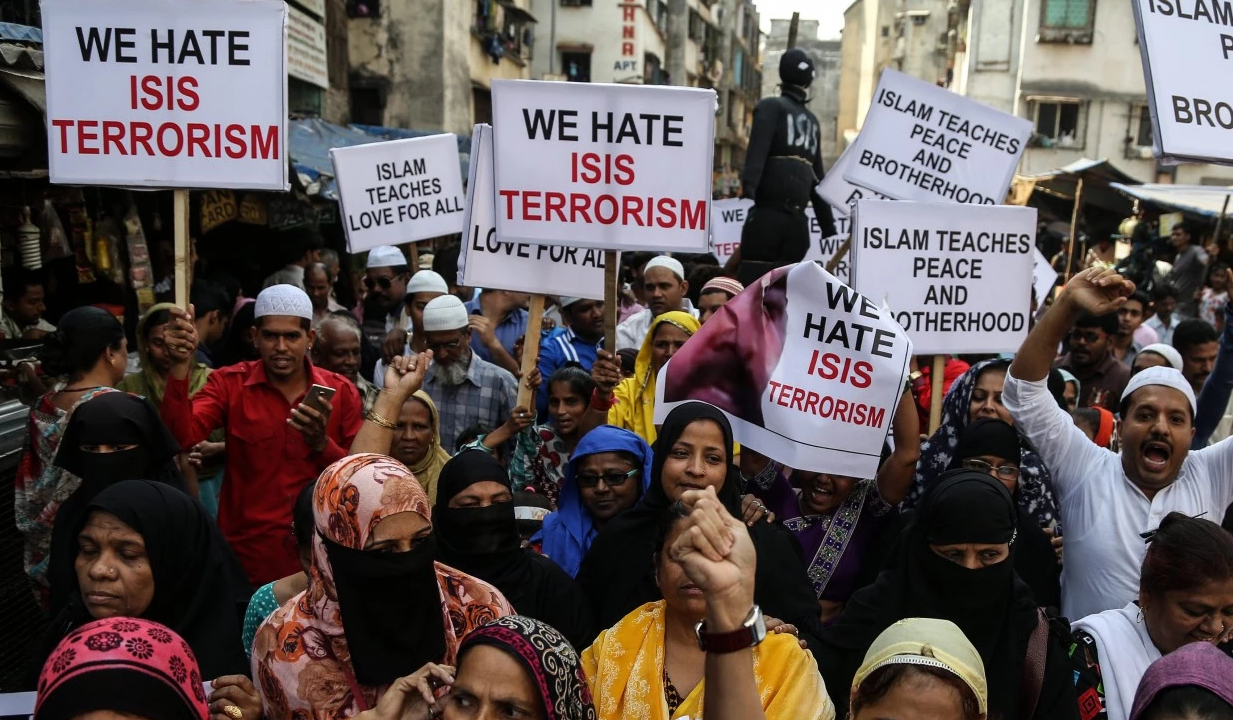Lost In Interpretation: Islam And The ISIS
Muslims protest against ISIS in Mumbai, India

NEW DELHI: A now familiar narrative has been doing the rounds in the aftermath of the dreadful attacks in Paris. That terrorism has no religion. That Islam is a religion of peace. That all religions endorse peace. That the ISIS recruits are vulnerable, angry, frustrated, misled youth who have been brainwashed into committing vicious crimes using an ideology (among other means) that claims to be Islamic but is actually a gross misinterpretation of Islam. In fact, there is nothing Islamic about what they do. By questioning Islam we are actually playing into the hands of the ISIS by making the community feel even more alienated.
To this, a counter narrative has emerged proclaiming that select passages within the Qoran do, in fact, endorse violence in certain contexts, which is what violent, extremist organisations exploit for their gains and in order to recruit militia. The ISIS’s medieval, dystopian world-view and methods are also an interpretation of the holy text and anyone who sees no connection between the two is not only kidding themselves but being shamelessly apologetic for their acts. It is time we finally face the facts- Islam and religion is responsible for a whole lot of ills in the world. The ISIS are cruel because they are Islamic fanatics.
Both views are not entirely wrong. Let us take each view in context.
The first narrative is nothing short of an appeal that aims to foster the simple understanding that it is not religion that is responsible for crime but people, and it is unfair to generalize a whole religion based on the acts of a few misled, disillusioned freaks. It is a narrative induced by fear that has emerged due to the persecution of innocent muslims during post terror crackdowns in the past.
The latter view is rooted in the Western/ European understanding of religion, which views it as an ideology that is and should be separate from the state, which is personal and not meant for the public space, and definitely must not be used to govern. This is very different from how religion is viewed in many other parts of the world such as in South Asia- as a faith and a way of life- where the state is held responsible for protecting people’s right to freely practice their religious beliefs in public and private (without hurting anyone in the process, of course).
I am no expert on theology or Islam but in my simple understanding- Islam, like any other religion, neither ‘endorses’ peace nor war. It is a belief system, among many belief systems, that a certain section of society chooses to understand life and live by. There are probably as many interpretations of it as there are practicing muslims, but the positive thing is these interpretations have been fairly actively debated in the public sphere since its conception. So, first, the idea of questioning Islam shouldn’t be all that appalling. Second, if it is unfair to paint every muslim with the same brush as ISIS terrorists, it is also incorrect to say that Islamic ideology has absolutely nothing to do with violence when ISIS militants (along with this angry, enthusiastic bunch of so called ‘new atheists’ are thrusting passages from the Quran in your face. That is also glossing over an entire religious people with the same brush, that of constituting only a peaceful people. This view also conveniently forgets the brutal, barbaric, war torn history of Islam among other religions. But more than anything, it takes away credibility from an otherwise well-meaning point with the aim to bring reassurance and peace in an insecure environment- that religion is not responsible for terrorism. And that argument in itself is adequate.
On the other hand, while technically the ISIS interpretation of Islam cannot be termed un Islamic, it is not the definition which a vast majority of the 1.6 billion muslim population of the world adheres to. And that is a crucial point to remember. If a radical, extremist form of Islam has managed to motivate some terrorists, it is also a religion that provides hope and comfort to millions. Gandhi once infamously remarked, ‘Those who try to separate religion from politics understand neither religion nor politics’. And what is terrorism, to borrow from Clausewitz’s conception of war, if not a continuation of politics by other means. Religion, then, becomes merely a cover for achieving the objectives of a certain kind of politics. If there weren’t religion, there would be something else. So fighting and blaming a whole religion or all religions is probably besides the point and diverts attention away from the actual issue- which is tackling terror and sick, abhorrent, ruthless, oppressive regimes such as the ISIS.
A pertinent issue remains though. How are young, educated, fairly privileged muslims who are seemingly well-integrated in modern societies joining groups such as the ISIS? How are they so easily indoctrinated with this radical, violent, extremist form of Islam? Is it an issue of an identity crisis? Is it an issue of adjusting to a new society? Is it an issue of feeling alienated as a minority? Maybe these are the questions we should be focusing on.
(The writer is completing her PhD at the School of International Studies, Jawaharlal Nehru University).



